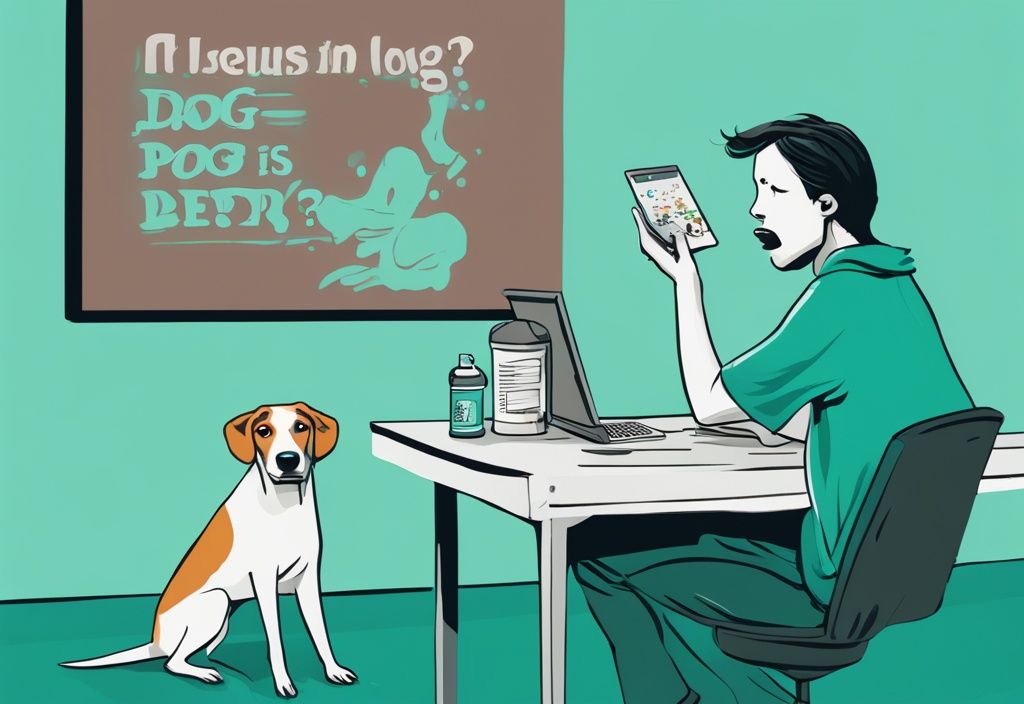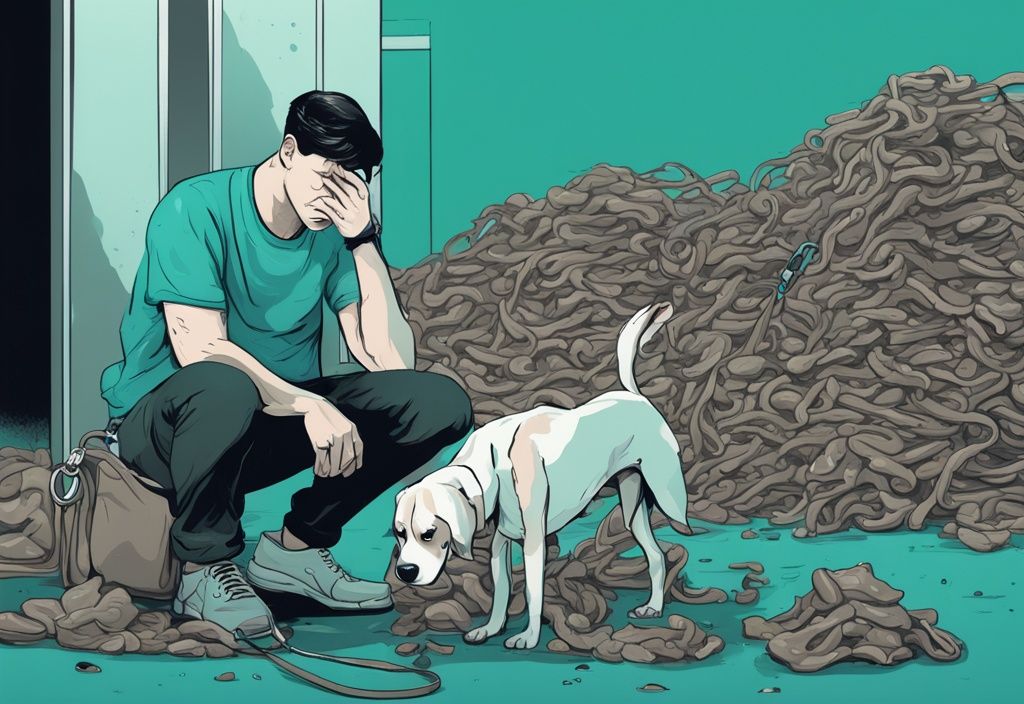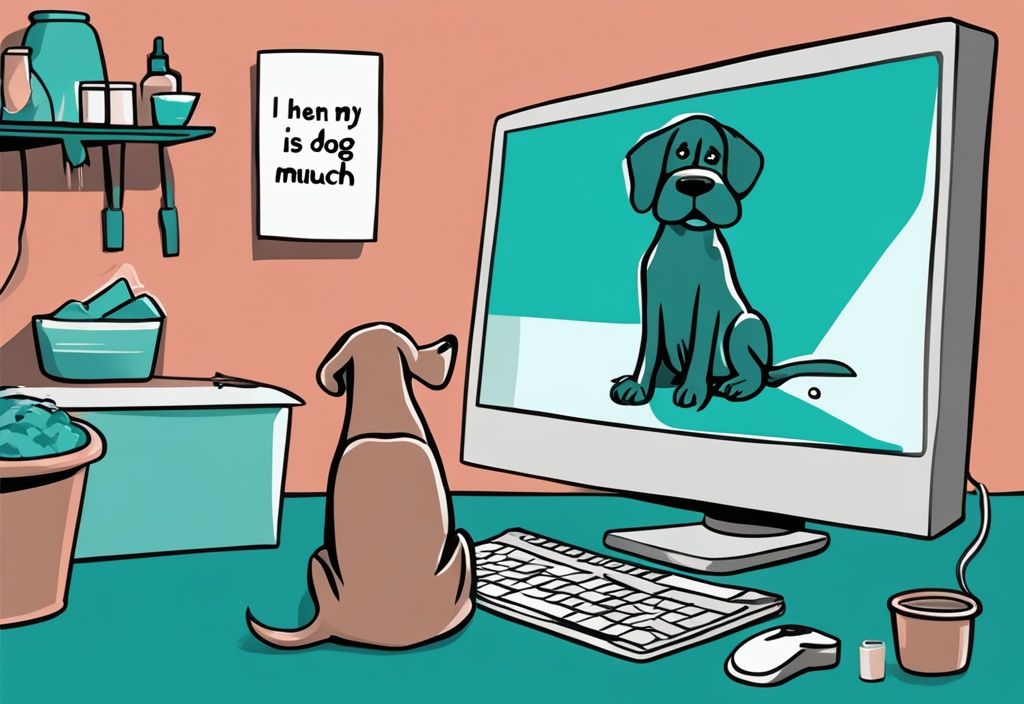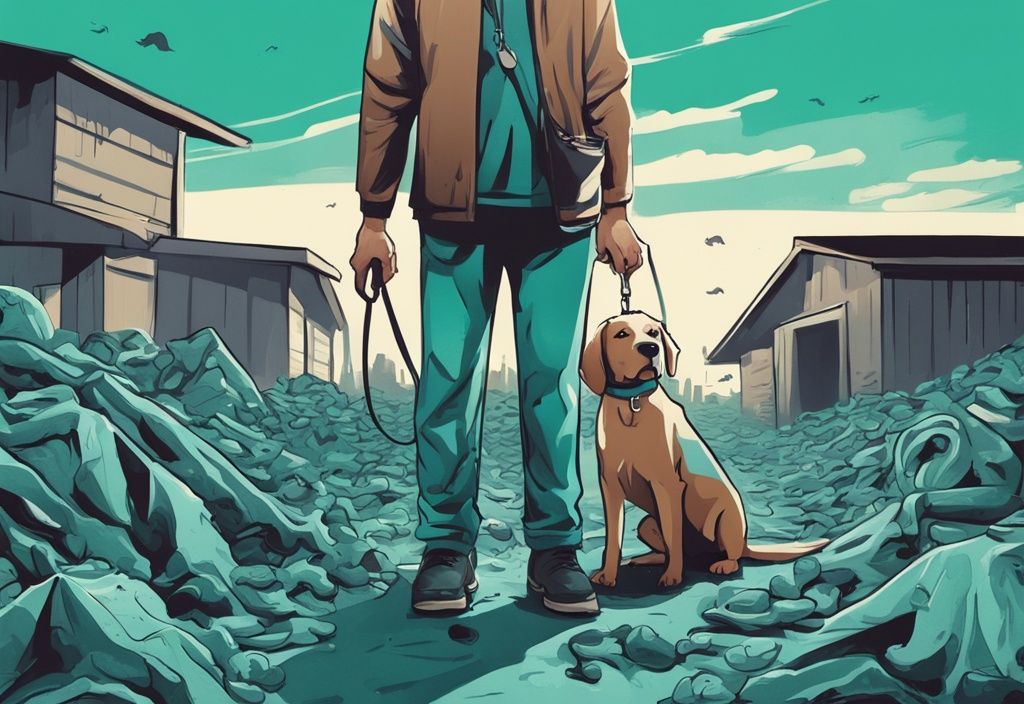Hello fellow pet lovers, has your beloved pawsome friend transformed your backyard into an obstacle course of dog poop lately? Oh, I’ve been there too – the ‘poopocalypse’ as I call it! Knowing why your dog is pooping so much can be a lifesaver, and that’s precisely what we’re going to dig into!
Rest assured, this article is your comprehensive guide to unraveling this smelly mystery. Is it the wrong food, a medical condition, or is your pooch simply stressed? Don’t worry, we’re in this together, and we’re going to figure it out! The objective? A healthier, happier pup – and a poop-free yard for you!
So, grab your detective cap as we delve into the world of doggy-doo and uncover actionable solutions to your K-9’s increased bowel movement- after all, a cleaner yard signifies a healthier pupper! Ready? Let’s dive in!
Understanding Your Dog’s Increased Poop Frequency
Many dog owners often wonder, “why is my dog pooping so much?” Deciphering your dog’s poop frequency is crucial for assessing their digestive health and overall well-being. After all, a happy tummy usually means a happy pup!
Normal Poop Frequency
For adult dogs, the poop schedule can range from 1-3 times daily. Puppies, with their boundless energy and rapid growth, often need to go about 4-5 times a day. On the flip side, older dogs, slowed down by a slower metabolism and less activity, usually poop around once a day. Knowing these norms helps spot any irregular patterns that might pop up.
Sudden Increase in Bowel Movements
Noticing your dog suddenly having more frequent bowel movements can be a little startling. It could be a sign of digestive issues or underlying medical conditions. Sometimes, it points to bacterial infections, parasites, or gastrointestinal diseases. Keeping an eye on your dog’s poop habits can clue you into potential health concerns early on.
Influence of Individual Factors
Other factors like age, hydration levels, and breed traits also play a role in how often your dog poops. Puppies and younger dogs naturally need more potty breaks due to their higher energy levels and growth spurts. Well-hydrated dogs often have more efficient digestive systems, leading to regular bowel movements. Some breeds, especially those with sensitive stomachs, might show varying poop patterns.
Exercise and Activity Levels
Exercise and activity levels can majorly impact your dog’s poop frequency. Regular physical activity speeds up metabolism, resulting in more frequent bowel movements. Ensuring your dog gets a balanced mix of exercise can help manage and normalize their poop schedule, supporting a healthier digestive system.
So, figuring out “why is my dog pooping so much” means looking at everything from diet and exercise to overall health and lifestyle. Every little detail counts when it comes to understanding your furry friend’s bathroom habits. In certain unfortunate situations, some pet owners may need to consider options such as how to euthanize a dog with Benadryl when dealing with severe health issues in their pet. Isn’t that all part of the joys of being a pet parent?

Causes of Frequent Pooping in Dogs: What You Must Know
Sometimes, all you want is a clear answer to “why is my dog pooping so much?” Let’s dive into the main causes, ranging from diet impacts to medical conditions and lifestyle changes, to help you understand this often puzzling behavior.
Decoding the Impact of Diet on Dog’s Pooping Habits
Does Overeating Increase Poop Frequency in Dogs?
So, let’s tackle one of the big questions first: “Why is my dog pooping so much?” Well, one common culprit could be overeating. When Max, my Border Collie, gobbles up more kibble than his tummy can handle, it often leads to a bit of a tummy upset and, you guessed it, more frequent trips outside. And it’s not just food; dogs can be adventurous eaters, chomping on sticks, dirt, or grass, adding to the problem. Keeping a close eye on how much your furry friend eats and ensuring it’s all good stuff is key for keeping those bathroom breaks regular and predictable.
Effect of Processed Foods on Your Dog’s Bowel Movements
Ever found yourself scratching your head, wondering, “why is my dog pooping so much?” Processed foods might be to blame.
Commercial kibble often packs in additives and preservatives that can mess with some dogs’ digestive systems. This was a hard lesson when Max’s diet made him more frequent with his bathroom breaks. Switching to a diet tailored to your dog’s health needs, possibly under a vet’s guidance, can make a world of difference. Think of it as crafting a menu that keeps their tummy happy and their pooping just right!
Does Changing Diet Lead to Increased Pooping?
Changing your dog’s diet can be a bit of a rollercoaster. When I switched Max to a brand-new, nutrient-rich food all of a sudden, he started pooping way more. So, if you’re asking, “why is my dog pooping so much?” a sudden diet change could be the answer. The trick is to transition gradually over a week or so, allowing their system time to adjust. And yes, a whole-food diet can work wonders, but remember to make those changes slowly to keep everything in balance.
Medical Conditions That Can Make Your Dog Poop More
Bacterial and Parasitic Infections: A Possible Cause?
Infections can be a significant factor when you’re questioning, “why is my dog pooping so much?” Types of bacteria like Salmonella and E.coli can wreak havoc on your dog’s digestive system, leading to increased poop frequency. Max, with his love for sniffing everything, was once affected by a bacterial infection. Dogs who enjoy a raw diet are particularly prone to these issues. Intestinal parasites, like hookworms, roundworms, tapeworms, whipworms, and giardia, can also disrupt normal poopy schedules. Getting a stool sample tested by your vet can pinpoint the problem, making it easier to get your pup back to normal.
Poop Frequency and Digestive Conditions in Dogs
Several medical conditions could be behind the question, “why is my dog pooping so much?” Think inflammatory bowel disease, food allergies, pancreatitis, and gastrointestinal infections. Even some medications, like steroids and antibiotics, can play a role in altering poop frequency. If your dog, like our Max, has been feeling off with more frequent pooping and other symptoms, it’s time for a vet visit. Early diagnosis and proper treatment can help manage these conditions effectively.
Can Stress or Lifestyle Changes Make Your Dog Poop More?
Isn’t it fascinating how life changes can throw off your dog’s pooping habits? If your dog has been pooping more often and you’re left thinking, “why is my dog pooping so much?” stress might be a key factor.
Stress and Routine Changes
Environmental changes like moving to a new house, traveling, or even introducing a new family member can impact your dog’s pooping frequency. Max became quite the frequent pooper when we moved last winter! Routine disruptions, loud noises, or shifts in household dynamics could all lead to more bathroom breaks. Managing stress through stability and a supportive environment helps your dog adjust back to their regular pooping schedule.
So, whether it’s their diet, a health issue, or just life’s little changes, there are many reasons why your dog might be pooping more. The journey to a happy, healthy pup is all about understanding these nuances and responding with care.
When Should You Worry About Your Dog’s Frequent Pooping?
Your dog’s bathroom habits can say a lot about their health, and frequent pooping is definitely one of those head-scratchers. Let’s delve into some plausible reasons and what you should do if your furry friend starts going too frequently.
Understanding Sudden Changes in Dog’s Bowel Movements
A sudden increase in your dog’s poop frequency can be quite alarming. You might find yourself wondering, “Why is my dog pooping so much?” This could be a sign of various issues, from dietary imbalances to more serious health concerns.
If your well-trained dog suddenly starts having accidents indoors, this may indicate an underlying illness, age-related issues, or even emotional disturbances. Keep a close eye on any changes, recording the frequency, consistency, and color of your dog’s poop. If this increase in frequency persists or comes with other symptoms like lethargy, make sure to consult a veterinarian right away to rule out any serious conditions.
Warning Signs to Watch Out for in Your Pooping Dog
When you’re asking, “Why is my dog pooping so much?” there are several warning signs to watch for. Be on the lookout for symptoms like low energy, an upset stomach, or loose stools. Significant changes in the color and consistency of feces are also red flags.

For older dogs or those with arthritis, the squatting position required for pooping can become uncomfortable, often resulting in more frequent but less productive bowel movements. Spotting these issues early and seeking timely treatment can prevent long-term damage to your dog’s digestive health.
Remember, it’s always better to be safe than sorry. If you notice any of these warning signs, don’t hesitate to seek veterinary advice.
Managing Your Dog’s Pooping Habits: Proven Strategies
Ever found yourself pondering, “Why is my dog pooping so much?” Let’s dive into some proven strategies that will help you get to the bottom of this (pun intended!) and restore some normalcy to your dog’s potty habits.
Adjusting Diet Gradually to Regulate Bowel Movement
When it comes to understanding why your dog might be pooping so much, their diet is a fantastic starting point. Think of your dog’s digestive system like a fine-tuned engine – it needs the right fuel to run smoothly. Now, changing their diet isn’t something to rush. A gradual transition over 5-10 days is key. During this period, slowly introduce the new food while phasing out the old to avoid any gastrointestinal drama. This helps reduce the risk of increased bowel movements and ensures that your dog’s tummy stays happy. And here’s a golden nugget from my own experience with Max, my bouncy Border Collie: opting for a whole-food diet can work wonders. Whole foods are better absorbed by the digestive tract and usually mean less poop. Win-win, right?
Prevention and Monitoring Tactics for Better Poop Health
Physical activity isn’t just for burning off excess energy – it’s a fantastic way to keep your dog’s bowels in check too. Regular exercise helps stimulate their digestive tract like a natural clockwork. So, those daily walks aren’t just fun outings; they’re essential for healthy pooping habits. Let’s not forget hydration – it’s crucial for smooth digestive operations. Make sure your furry friend always has access to fresh water, especially after playtime or walks.
To keep everything shipshape, routine stool tests are a savvy move. These tests can pick up on any sneaky parasites, bacteria, or other issues that might be behind that question of why your dog is pooping so much. Think of them as your secret weapon in maintaining your dog’s poop health.
Role of a Balanced Diet in Normalizing Dog’s Poop
A balanced diet is the cornerstone of regulating your dog’s bowel habits, and understanding the specific dietary nutrient concentrations based on their life stage is essential. You can learn more about the nutritional requirements of small animals from the [Merck Veterinary Manual](https://www.merckvetmanual.com/management-and-nutrition/nutrition-small-animals/nutritional-requirements-of-small-animals). Imagine feeding them a high-quality, whole-food-rich diet that’s gentle on their digestive system. Trust me, the difference can be night and day. Tailoring this diet to meet your dog’s specific needs is equally crucial – because just like us, each dog is unique. My Border Collie, Max, for instance, thrives on a diet designed to suit his energetic lifestyle. Consulting with your vet can set you on the right path to choosing the perfect diet, tailored just for your dog’s health condition and life stage.
These strategies might feel like a small change, but they can make a significant impact on reducing excessive pooping. And here’s the cherry on top: you get peace of mind knowing you’ve tackled the issue head-on. Plus, your dog will thank you with those happy, wagging tails and fewer messy surprises.
When to Visit a Vet for Your Dog’s Increased Pooping
If your dog seems to be pooping more than usual, it’s crucial to keep an eye out for signs that might require a vet visit. Increased frequency can be caused by a range of issues, from diet to health conditions. If you’ve ever wondered, “Why does my dog chew his bone on me?”, this behavior could be a clue to underlying issues. Understanding when to seek professional help can make all the difference for your furry friend.
Why does my dog chew his bone on me?
Immediate Medical Attention: When is It Needed?
If you’re scratching your head wondering, “Why is my dog pooping so much?” you’re not alone. Notice if your pup is showing other concerning symptoms along with the increased number of potty breaks. A lethargic dog, one with an ongoing upset stomach, or unusually loose stools might need immediate vet care. Ever seen dramatic changes in the color or consistency of your dog’s poop? It’s a red flag. Quick action is vital to rule out severe conditions like infections or digestive disorders. A quick visit to the vet can ensure your dog stays healthy and happy.
Tests That Can Help Diagnose Your Pooping Dog
Bringing your pooch to the vet for frequent pooping may involve various diagnostic tests. Stool tests are front and center, helping to catch parasites, bacteria, or other gut troubles. Blood tests? They’re super helpful in spotting hidden health problems like infections or inflammation. And let’s not forget those high-tech X-rays and ultrasounds — perfect for catching internal blockages or abnormal growths. A thorough vet check-up will give you a clear picture of what’s causing all that extra poop.

Effective Treatment Options for Increased Dog Pooping
Treating your dog’s increased pooping comes down to nailing the root cause. If a poor diet is to blame, your vet might suggest some tasty dietary tweaks tailored to your dog’s needs. For stress or anxiety-induced bathroom breaks, there are medications or behavioral therapies that can help your pup relax. Spotted some pesky parasites? No worries — your vet will have a plan to get rid of them. The right course of action, guided by your vet, will get your dog back to a regular potty schedule in no time.
Conclusion: Keep Calm and Monitor Your Dog’s Poop
Understanding why is my dog pooping so much can feel overwhelming. But trust me, taking a structured and calm approach makes managing your pet’s health a real breeze. Dogs, much like humans, have bowel habits that can fluctuate due to various factors. Recognizing these fluctuations and knowing when to seek professional advice is crucial for your dog’s well-being.
Firstly, acknowledge that a diverse range of factors can influence your dog’s poop frequency—age, diet, exercise, and even stress levels. Max, my energetic Border Collie, once had a spike in bowel movements just because we switched his kibble! Increased exercise or dietary changes might temporarily up their bathroom visits. Understanding these normal variations will save you from jumping to conclusions at the first sight of more poop. Monitoring your dog’s poop regularly is essential. For those curious about animal behavior, you might also wonder why your cat jumps on your back. Make it a habit to note the color, consistency, and frequency of their bowel movements. This baseline information lets you quickly spot any abnormalities. It’s like being your dog’s health detective! Sudden increases in frequency, drastic changes in color or consistency, or symptoms like lethargy mean it’s time to see the vet. Early recognition of these warning signs is vital.
Veterinary advice is a cornerstone in managing your dog’s dietary and health needs. Vets can provide tailored dietary recommendations and treatment plans if required. Think of them as your go-to experts for ensuring your dog gets the best nutrition and care. Periodic stool testing or consultations for notable changes in your dog’s poop habits can prevent potential long-term health issues.
In summary, managing your dog’s poop frequency involves understanding normal fluctuations, staying vigilant for warning signs, and seeking expert advice when necessary. This approach will help you maintain your pet’s health and address the common query: why is my dog pooping so much? With love, attention, and a little detective work, you’ll ensure the best care for your furry friend.
Frequently Asked Questions
What is the Normal Poop Frequency for a Healthy Dog?
Wondering why your dog is pooping so much? Well, it really depends on your furry friend’s age. Adult dogs usually poop 1-3 times a day. Puppies? They can go 4-5 times daily. And for our senior buddies, once a day is pretty standard.
Can Stress Cause Increased Pooping in Dogs?
Oh yes, stress can definitely mess with your dog’s system! Whether it’s changes in their environment, separation anxiety, or booming loud noises, stress can lead to more frequent bathroom breaks. Imagine you or I getting a bit of an upset stomach when we’re super stressed; our dogs are no different.
How to Handle a Dog Who’s Suddenly Pooping Indoors?
If Max, your once well-trained dog, suddenly starts pooping indoors, don’t panic just yet. Look for potential causes: illness, aging, or maybe emotional upheavals like changes in routine. It’s always a good idea to have a vet check things out. Sometimes a little behavior modification does the trick!
How to Change Diet Without Triggering Digestive Upset in Dogs?
Switching up your dog’s diet? Do it gradually over 5-10 days to avoid any tummy troubles. Start by mixing a little of the new food with the old. Gradually increase the new food portion while decreasing the old. This gives your dog’s digestive system a smooth transition.
When Should Changes in Poop Consistency and Color Worry You?
Seeing some drastic changes in Max’s poop consistency or color? Let’s not ignore that. If he looks lethargic, has an upset stomach, or you notice loose stools, it’s time for a vet visit. Sometimes, these can indicate serious health concerns that need immediate attention.
